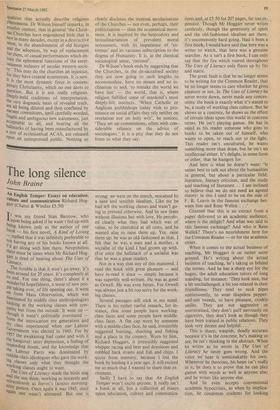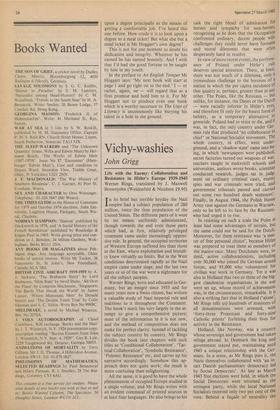The long silence
John Braine
An English Temper: Essays on education, culture and communication Richard. Hog- gall (Chau.° & Windus £5.50) It was my friend Stan Barstow, who Upon being asked if he wasn't fed up with b, eIng known only as the author of one book — his first novel, A Kind of Loving
replied that it was infinitely preferable to not having any of his books known at all. I'dgo along with him there. Nevertheless there must be times when Mr Richard Hog- gart is tired of hearing about The Uses of Literacy,
The trouble is that it won't go away. It's been around for 25 years. It's completely at its end. For one thing, there's about it a wonderful hopefulness, a sense of new peo- Ple taking over, of life opening out. It went on from Mass Observation, which was dominated by middle class anthropologists `coking at the working classes with sym- pathy but from the outside. It went on — though it wasn't politically overstated — from the intoxication my generation and MY class experienced when our Labour Government was elected in 1945. For by 1957 the awakening had come and with it the hangover: utter depression, a feeling of the Labour Party was dominated by
rni . ddle-class ideologues who gave the work-
'rig classes only what they thought the working classes ought to want. The Uses of Literacy made the birds sing and the sun shine, working as instantly and Miraculously as Jeeves's famous morning- after potion. Once again it was 1945, once again one wasn't alienated. But one is
wrong: we were on the march, sustained by a sane and sensible idealism. Like me he had left the working classes and wasn't go- ing to pretend otherwise. And he saw them without illusions but with love. He perceiv- ed clearly what they had which was of value, to be cherished at all costs, and he wanted also to raise them up. Yes: raise them up: he was as old-fashioned as that. I felt that he was a man and a mother, a socialist of the kind I had grown up with. (For once the hallmark of a socialist was that he was a great reader).
Not in a way that any of this mattered. I read the book with great pleasure — and have re-read it since — simply because it was superbly well-written. He was as good as Orwell. He was even better. For Orwell was always just a bit too sorry for the work- ing classes.
Several passages still stick in my mind. There is his rather rueful remark, for in- stance, that some people have working- class faces and some people have middle- class faces. A flat cap worn by someone with a middle-class face, he said, irresistibly suggested hunting, shooting and fishing and a place in the country. Worn by him, Richard Hoggart, it irresistibly suggested whippet racing and beer and dominoes and cobbled back streets and fish and chips. quote from memory, because I lost the book by lending it a year ago. It still excited me so much that I wanted to share that ex- citement.
Sadly I have to say that An English Temper won't excite anyone. It really isn't a book at all, but a collection of essays upon education, culture and communica-
tions and, at £5.50 for 207 pages, far too ex- pensive. Though Mr Hoggart never writes carelessly, though the generosity of spirit and the old-fashioned idealism are there, it's uncommonly hard going. Had it been a first book, I would have said that here was a writer to watch, that here was a genuine searcher. As it isn't a first book, I can only say that the fire which roared throughout The Uses of Literacy only flares up by fits and starts.
The great fault is that he no longer seems to be writing for the Common Reader, that he no longer seems to care whether he gives pleasure or not. In The Uses of Literacy he never wrote down, never made any conces- sions: the book is exactly what it's stated to be, a study of working class culture. But he shows us a concrete, he shows us the effect of certain ideas upon this world in concrete terms. He isn't playing games. He has in mind as his reader someone who goes to books to be taken out of himself, who wants to open, to reach out to the light. This reader isn't uncultured, he wants something more than dope, but he isn't an intellectual either. It's delight, in some form or other, that he hungers for.
And here is what he doesn't want: 'It seems best to talk not about the humanities in general, but about a particular field: literature, literary criticism, and the study and teaching of literature... I am inclined to believe that we do not need an agreed theory: in this I tend to be on the side of F. R. Leavis in the famous exchange bet- ween him and Rene Wellek . . .'
Granted that this is an extract from a paper delivered to an academic audience, where is the delight? And what was said in this famous exchange? And who is Rene Wellek? There's no nourishment here for the Common Reader — or for the academic either.
When it comes to the actual business of teaching, Mr Hoggart is on rather surer ground. He's writing about the actual business of teaching, he's taking us behind the scenes. And he has a sharp eye for the bogus, the adult education tutors of long standing, for instance: 'They look nice, but a bit unchallenged, a bit too relaxed in their friendliness. They tend to suck pipes reminiscently, to wear shapeless pepper- and-salt tweeds, to have pleasant, crinkly smiles. They are not aggressive or overstrained, they don't puff nervously on cigarettes, they don't look as though they have been trained in public relations. They look very decent and helpful....'
This is sharp, waspish, deadly accurate because it's in the concrete, he's making us see, he isn't thinking in the abstract. When he writes as he wrote in The Uses of Literacy he never goes wrong. And the voice we hear is unmistakably his own. Whenever he theorises, his heart isn't really in it, he does it to prove that he can play games with words as well as anyone else; and he writes like anyone else.
And he even accepts conventional academic hypocrisies, as when by implica- tion, he condemns students for looking
upon a degree principally as the means of getting a comfortable job. I've heard this one before. How crude it is to look upon a degree as a meal ticket! But what else but a meal ticket is Mr Hoggart's own degree?
This is not for one moment to doubt his dedication and integrity. Whatever he has earned he has earned honestly. And I wish that I'd had the good fortune to be taught by him in my youth.
In the preface to An English Temper Mr Hoggart says: 'My next book will start at page 1 and go right on to the end.' I — or rather, again, we — will regard that as a firm promise and hold him to it. For Mr Hoggart not to produce even one book which is a worthy successor to The Uses of Literacy is uncommonly like burying his talent in a hole in the ground.





































 Previous page
Previous page